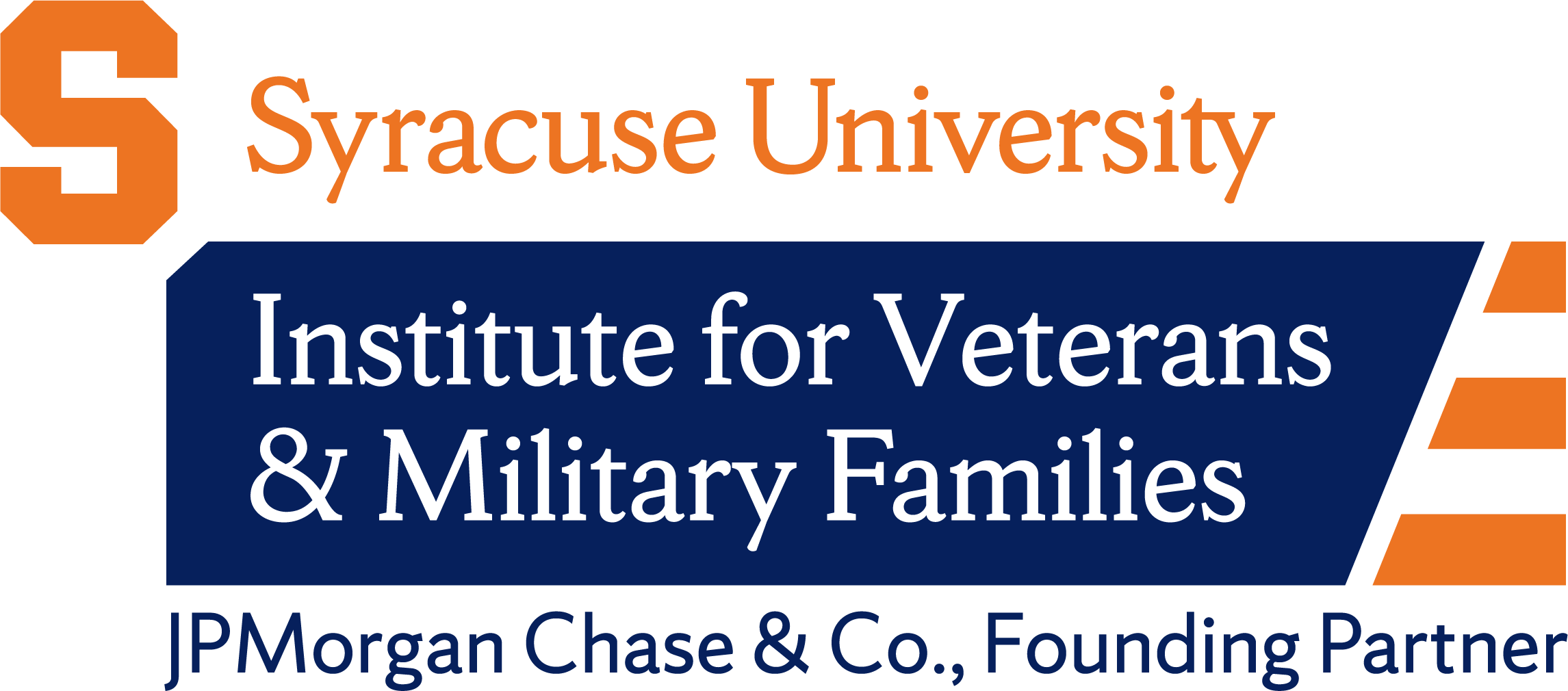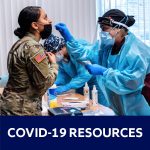Entrepreneurship
The Institute for Veterans and Military Families at Syracuse University is committed to supporting veterans and their families as they navigate their entrepreneurial journey. For more than a decade, the IVMF has served over 120,000 veterans and we are just getting started. Arm yourself for entrepreneurship success with the IVMF’s ARSENAL of programs.
Entrepreneurship Research
National Survey of Military-Affiliated Entrepreneurs
Operation Vetrepreneurship
Veteran Entrepreneurship: What You Should Know
Veteran Entrepreneurship: Access to Capital Challenges and Opportunities
The State of Veteran Entrepreneurship Research
National Survey of Military-Affiliated Entrepreneurs
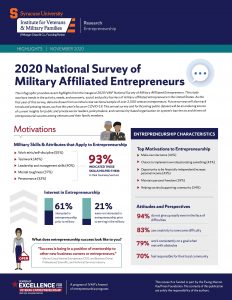
The IVMF National Survey of Military-Affiliated Entrepreneurs monitors trends in the activity, needs, and economic, social, and policy barriers of military-affiliated entrepreneurs in the United States. In its inaugural year, the intent was to draw from a cross-sectional sample of over 2,500 veteran entrepreneurs. Future surveys will also track trends and pressing issues. For example, in 2020 the survey was updated to focus on such COVID-19. All NSMAE surveys and forthcoming public datasets will be an enduring source of current insights for public and private sector leaders, policymakers, and community-based organization on systemic barriers to and drivers of entrepreneurial success among veterans and their family members.
Operation Vetrepreneurship
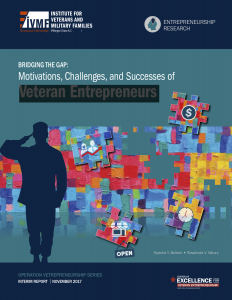 Veterans have launched businesses at higher rates than civilians for many decades. Just ten years ago, few programs for veterans taught entrepreneurship or provided tools to help them create sustainable businesses. Fast forward to 2017: hundreds of organizations and programs across the country are aimed at propelling veteran entrepreneurs forward, including many accelerators and incubators. Both transitioning service members and veterans now have access to a sea of information on business ideation and creation. Still, despite the proliferation of veteran entrepreneurship programs and services, in recent years, little research has been done on the motivations, challenges, and successes of veteran entrepreneurs. The result is a gap in understanding how to design and deliver effective programs and support for veteran business owners.
Veterans have launched businesses at higher rates than civilians for many decades. Just ten years ago, few programs for veterans taught entrepreneurship or provided tools to help them create sustainable businesses. Fast forward to 2017: hundreds of organizations and programs across the country are aimed at propelling veteran entrepreneurs forward, including many accelerators and incubators. Both transitioning service members and veterans now have access to a sea of information on business ideation and creation. Still, despite the proliferation of veteran entrepreneurship programs and services, in recent years, little research has been done on the motivations, challenges, and successes of veteran entrepreneurs. The result is a gap in understanding how to design and deliver effective programs and support for veteran business owners.
Veteran Entrepreneurship: What You Should Know
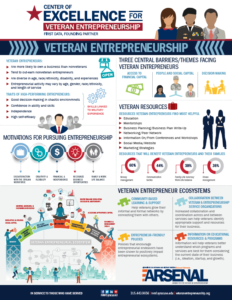 Military service and small business ownership share a distinctive relationship, dating back more than a half century. Veterans remain more likely to own a business than nonveterans and often tend to out-earn nonveteran entrepreneurs. High-performing entrepreneurs tend to demonstrate good decision-making in chaotic environments, confidence, independence, and high self-efficacy and achievement —all traits commonly found in service members and veterans.
Military service and small business ownership share a distinctive relationship, dating back more than a half century. Veterans remain more likely to own a business than nonveterans and often tend to out-earn nonveteran entrepreneurs. High-performing entrepreneurs tend to demonstrate good decision-making in chaotic environments, confidence, independence, and high self-efficacy and achievement —all traits commonly found in service members and veterans.
Veteran entrepreneurs derive from a diverse population with unique experiences but they also encounter challenges at all stages of their business ownership journey. Below are a few highlights about what we know about veteran entrepreneurs, reasons they pursue entrepreneurship, and the resources and ecosystems that have helped veteran entrepreneurs with their businesses.
Veteran Entrepreneurship: Access to Capital Challenges and Opportunities
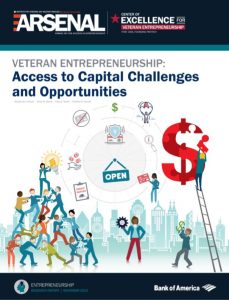 The search for capital to support small businesses is a challenge for all potential entrepreneurs, regardless of veteran status. For anyone, the initial startup phase is one of the most difficult and risky in the life cycle of a business. Though many small businesses are created each year, a significant number of small businesses close as well. Though veterans acquire substantial skills and knowledge during their tenure in military service that are transferable to the business world, this experience also may create additional issues that create unique barriers to starting a new business.
The search for capital to support small businesses is a challenge for all potential entrepreneurs, regardless of veteran status. For anyone, the initial startup phase is one of the most difficult and risky in the life cycle of a business. Though many small businesses are created each year, a significant number of small businesses close as well. Though veterans acquire substantial skills and knowledge during their tenure in military service that are transferable to the business world, this experience also may create additional issues that create unique barriers to starting a new business.
In recent years, there have been attempts to address this issue through various programs and funding initiatives, and although helpful to some veteran entrepreneurs, this solution may not be the right fit for every business owner. There are still some nuances to the issue of access to capital and the concept of capital readiness needs to be further explored through research, so that solutions can be designed and implemented that will better prepare veteran entrepreneurs.
The State of Veteran Entrepreneurship Research
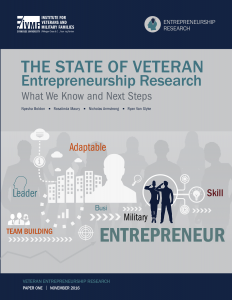 This paper reviews the current state of research on veteran entrepreneurship, identifies critical gaps, and offers recommendations for future research. The authors reviewed federal datasets and scholarly literature (via Web of Science, Scopus, PubMed, and Google Scholar). This review reveals that a majority of the knowledge on veteran entrepreneurship is concentrated on veteran-specific traits, how these traits equip them to be successful entrepreneurs, and employment assistance programs for veterans with a service-connected disability. The paper is organized into three sections: a background section on national- and veteran-owned business ownership trends, a review of the current academic literature on veteran entrepreneurship, and a final section that identifies key research gaps and next steps, including emerging topics of interest such as women veteran and minority veteran business owners.
This paper reviews the current state of research on veteran entrepreneurship, identifies critical gaps, and offers recommendations for future research. The authors reviewed federal datasets and scholarly literature (via Web of Science, Scopus, PubMed, and Google Scholar). This review reveals that a majority of the knowledge on veteran entrepreneurship is concentrated on veteran-specific traits, how these traits equip them to be successful entrepreneurs, and employment assistance programs for veterans with a service-connected disability. The paper is organized into three sections: a background section on national- and veteran-owned business ownership trends, a review of the current academic literature on veteran entrepreneurship, and a final section that identifies key research gaps and next steps, including emerging topics of interest such as women veteran and minority veteran business owners.
Stay up-to-date on the latest resources from IVMF.
[gravityform id=”8″ title=”false” description=”false”]

Thank you to our generous sponsor, USAA, for making this resource hub possible.
